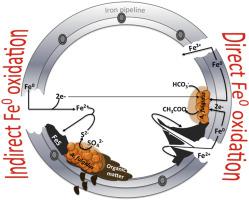当前位置:
X-MOL 学术
›
Int. Biodeterior. Biodegrad.
›
论文详情
Our official English website, www.x-mol.net, welcomes your
feedback! (Note: you will need to create a separate account there.)
Iron corrosion induced by the hyperthermophilic sulfate-reducing archaeon Archaeoglobus fulgidus at 70 °C
International Biodeterioration & Biodegradation ( IF 4.1 ) Pub Date : 2020-10-01 , DOI: 10.1016/j.ibiod.2020.105056 Oulfat Amin Ali , Emmanuel Aragon , Armand Fahs , Sylvain Davidson , Bernard Ollivier , Agnès Hirschler-Rea
International Biodeterioration & Biodegradation ( IF 4.1 ) Pub Date : 2020-10-01 , DOI: 10.1016/j.ibiod.2020.105056 Oulfat Amin Ali , Emmanuel Aragon , Armand Fahs , Sylvain Davidson , Bernard Ollivier , Agnès Hirschler-Rea

|
Abstract This work assessed the role of the hyperthermophilic sulfate-reducing archaeon, Archaeoglobus fulgidus in anaerobic iron corrosion, at 70 °C, in the presence and the absence of lactate as energy source. Experiments performed with A. fulgidus planktonic cells, displayed their capacity to form a biofilm on an iron coupon and exhibited their biocorrosive activity. A. fulgidus was shown to cause indirect corrosion by producing sulfide while oxidizing lactate. Furthermore, the archaeon could grow lithotrophically by using elemental iron as a mineral energy source. Under these latter conditions, A. fulgidus formed chimneys enhancing the direct corrosion process. Moreover, physiological modifications occurred under these conditions notably highlighting the probable use of CO2 instead of sulfate as a terminal electron acceptor to produce acetate similarly to homoacetogens. All together, these results illustrate the metabolic versatility and hence the importance of this hyperthermophilic archaeon in microbial induced corrosion (MIC).
中文翻译:

70 °C 下超嗜热硫酸盐还原古菌 Archaeoglobus fulgidus 引起的铁腐蚀
摘要 这项工作评估了在 70 °C 下,在乳酸作为能源存在和不存在的情况下,超嗜热硫酸盐还原古生菌 Archaeoglobus fulgidus 在厌氧铁腐蚀中的作用。用 A. fulgidus 浮游细胞进行的实验显示了它们在铁试样上形成生物膜的能力,并展示了它们的生物腐蚀活性。A. fulgidus 被证明通过在氧化乳酸的同时产生硫化物而引起间接腐蚀。此外,古菌可以通过使用元素铁作为矿物能源进行岩石营养生长。在后一种条件下,A. fulgidus 形成了增强直接腐蚀过程的烟囱。而且,在这些条件下发生的生理变化特别突出了可能使用 CO2 代替硫酸盐作为末端电子受体来产生类似于同型产乙酸的乙酸盐。总之,这些结果说明了代谢的多功能性,因此说明了这种超嗜热古菌在微生物诱导腐蚀 (MIC) 中的重要性。
更新日期:2020-10-01
中文翻译:

70 °C 下超嗜热硫酸盐还原古菌 Archaeoglobus fulgidus 引起的铁腐蚀
摘要 这项工作评估了在 70 °C 下,在乳酸作为能源存在和不存在的情况下,超嗜热硫酸盐还原古生菌 Archaeoglobus fulgidus 在厌氧铁腐蚀中的作用。用 A. fulgidus 浮游细胞进行的实验显示了它们在铁试样上形成生物膜的能力,并展示了它们的生物腐蚀活性。A. fulgidus 被证明通过在氧化乳酸的同时产生硫化物而引起间接腐蚀。此外,古菌可以通过使用元素铁作为矿物能源进行岩石营养生长。在后一种条件下,A. fulgidus 形成了增强直接腐蚀过程的烟囱。而且,在这些条件下发生的生理变化特别突出了可能使用 CO2 代替硫酸盐作为末端电子受体来产生类似于同型产乙酸的乙酸盐。总之,这些结果说明了代谢的多功能性,因此说明了这种超嗜热古菌在微生物诱导腐蚀 (MIC) 中的重要性。











































 京公网安备 11010802027423号
京公网安备 11010802027423号